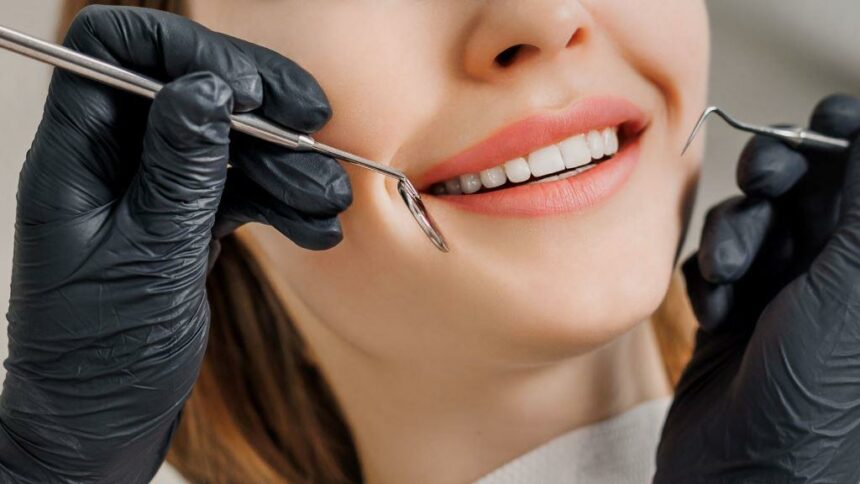Veneers are one of the best ways to have a beautifully even smile - you can use them to change the shape, colour and size of a tooth. However, it is an expensive solution, and one that lasts a lifetime. So it's important to choose the right kind of veneers, which can be a bit overwhelming if you don't know anything about them. We have decided to make this choice easier for you. So find out the difference between composite veneers in the UK and porcelain veneers in the UK.
Veneers - what are they?
Let's start with what veneers are in general. Veneers are a very thin layer of plastic that resembles real teeth and is bonded to them. With veneers, you can improve the appearance of your smile - both the colour or shape and the size of each tooth. Composite veneers in the UK and porcelain veneers in the UK are, of course, not the only way - we wrote about others in the article "How do you achieve a Hollywood smile and how much does it cost?".

Who are composite veneers in the UK and porcelain veneers in the UK for?
Who are veneers for? For everyone, in fact - after all, everyone can dream of a beautiful smile in a relatively short period of time and without much effort. However, there are instances when veneers are recommended particularly strongly. One of these is, for example, a dead tooth. A tooth without a living pulp changes colour over time - it becomes bluish, dull and stands out from the rest of the dentition.
It can be whitened at the dentist's office, but it takes a little longer and you may need to repeat the treatment after some time. Veneers are a long-term solution. They have another advantage - they strengthen weakened teeth, which is what this dead tooth is. We wrote about dead tooth whitening in a recent article - 'Dead tooth whitening in the UK'.
Composite veneers in the UK and porcelain veneers in the UK work great if you want to get rid of diastema, which is the gap between your ones. With veneers you can change the shape and size of your teeth, so it's a very good solution. You can read more about ways to get rid of diastema in the article "Gap between teeth - where does it come from and how can it be removed?".
Most often, people choose to for veneers due to crooked teeth. When they do not want to wait several years to straighten their teeth with braces, veneers will be a very good solution for them. We wrote about orthodontic treatment in the article "Fixed braces in the UK - indications and costs".
Veneers will provide not only a straight, but also an instantly white smile. After the removal of braces, this would only be possible with teeth whitening in the dental office, which you can find out more about in the text "Teeth whitening in the UK - find out about prices and possible options".

Composite veneers in the UK and porcelain veneers in the UK - the differences
It is time to move on to the differences between composite and porcelain veneers. As the names themselves suggest, they differ primarily in the material of fabrication. What is the difference between composite and porcelain? Several things.
Composite veneers in the UK are quite a lot cheaper than veneers porcelain veneers in the UK. Costing £180 per veneer at our dental practice, they are made from a light-curing material that is also used to fill cavities in teeth. Interestingly, the time taken to make them is relatively low, so it is a quicker solution.
However, they also have disadvantages. First of all, composite veneers in the UK are less durable and resistant to staining than porcelain veneers. In addition, they have a uniform colour, which can look quite artificial.
Porcelain veneers in the UK are significantly more expensive Than their composite counterpart. For one porcelain veneer you will pay £450. When you need multiple veneers, the cost can be very high. However, we would like to remind you that at our practice, when the cost exceeds £350, you can spread the payment into instalments. Our system is fully secure and authorised by the Financial Conduct Authority (FCA number 619628).
Apart from the price, porcelain veneers in the UK have a number of advantages. They are highly durable and resistant to staining. In addition, they closely resemble natural teeth, thanks to translucency, which is responsible for the transparency and shine of the veneers to resemble natural enamel.

Placement of composite veneers in the UK and porcelain veneers in the UK
You will only be able to have veneers placed on your teeth if all your teeth are healthy or healed. If they are not, you will first need to make enough visits to your dentist to have all your teeth healed. When your teeth are healthy, the dentist will grind them so that he can later bond the finished veneers to them. After grinding, he will make an impression of you, which will be given to a prosthodontist, who in turn will make your veneers.
When your composite veneers in the UK or porcelain veneers in the UK are readytogether with your dentist to check whether they are what you expected and whether they will fit. If so, they will be bonded to your teeth using a special cement. The last step is to expose the bonded veneers to light so that they bond to your teeth as permanently as possible.
If, despite knowing the differences between composite and porcelain veneers, you are wondering which to choose, make an appointment in our dental practice. We will be happy to advise you!

